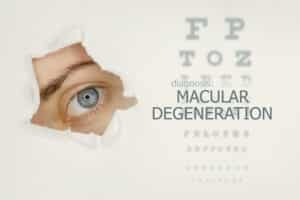Five Tips to Reduce Vision Loss from Dry Age-Related Macular Degeneration

Home care offers vital support and care for seniors with Dry Age-Related Macular Degeneration.
Age-related macular degeneration (AMD) is divided into two types: dry and wet. AMD is the leading cause of vision loss among the elderly and affects millions every year. Dry AMD is the earlier stage of the disease, during which steps can be taken to maintain the current level of sight with the help of home care and medical support, while Wet AMD is only diagnosed in the late stages of the disease.
Leading Causes of Dry AMD
Dry AMD affects the central area of a person’s vision. It may make it difficult to focus on smaller images, such as words on a page or instructions on a prescription bottle. It can also cause blurriness in the central line of vision, creating difficulties when recognizing faces, watching television, and driving a car.
Many people who develop Dry AMD develop it for the simple reason of getting older. The area of the eye affected by dry AMD (the macular) thins and ages with the person, resulting in a reduction of the cells responsible for vision.
Additional Risk Factors
While age is the determining factor, other risk factors can increase the possibility of your loved one developing dry AMD.
- Family history. If others have had wet or dry AMD, your loved one’s risk increases.
- Cardiovascular Disease. Having high blood pressure or other heart and blood vessel health issues can increase the chance of dry AMD developing.
- Obesity. Obesity not only increases the risk of dry AMD, but it also increases the risk of dry AMD progressing to wet AMD.
- Smoking and Second-Hand Smoke. Being regularly exposed to tobacco smoke increases the risk of dry AMD.
Reducing Further Vision Loss related to Dry AMD
Once your loved one has experienced the symptoms of dry AMD and has been diagnosed, those symptoms cannot be repaired, but you can help her to take steps to slow down the progression of the disease and possibly prevent further damage to her macular. Your loved one might be able to implement these changes on her own, or she may need the help of a home care team who can step in and support her through the process.
A home care team can help her implement changes and assist her in areas that she can no longer perform due to her vision loss. Despite making some lifestyle changes to reduce the progression of the disease, your loved one may still need help from a home care team with transportation, preparing meals, and any other tasks that require the ability to see small areas.
Five Steps for Your Loved One with the Help of Home Care
- Stop smoking if she smokes. If she lives with a smoker or has a smoker visit regularly, the smoker needs to begin only smoking outside while your loved one isn’t nearby.
- Exercise regularly. Getting into better physical shape and losing weight can help reduce the risk of the disease progressing.
- Manage any medical conditions that make dry AMD worse. If your loved one has high blood pressure or cardiovascular disease, make sure she takes all prescribed medications and has regular check-ups with her doctor to keep the condition under control.
- Add more fresh fruit and vegetables to the diet. These are packed full of antioxidants, which can help reduce the progression of degeneration.
- Increase Omega-3 Fatty Acids. Found in fish like salmon and sardines, as well as walnuts, these fatty acids can improve the health of the eyes.
If you or someone you know needs Home Care in Daphne, AL, please contact the friendly caregivers at Hughes Home Care. We provide quality and affordable care for your elderly loved ones in our community. Serving Mobile & Baldwin County. Call us today at (251) 517-9901
- Risk Factors that Increase the Likelihood of Heart Failure - April 11, 2025
- Is it Possible for Seniors to Eat 30 Plants a Week? - March 25, 2025
- Healthy Aging: Why Remaining Active Matters - March 7, 2025
